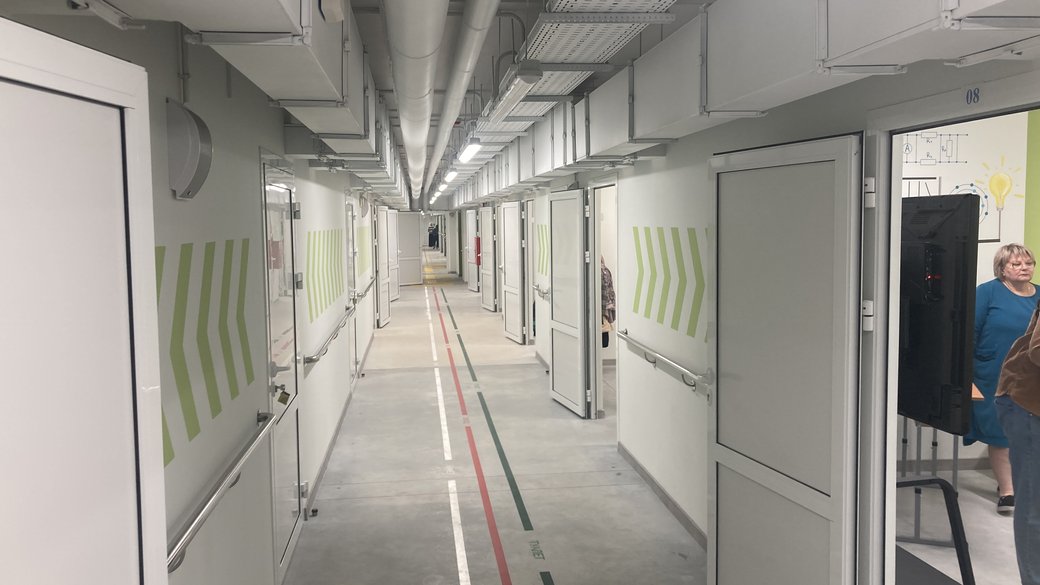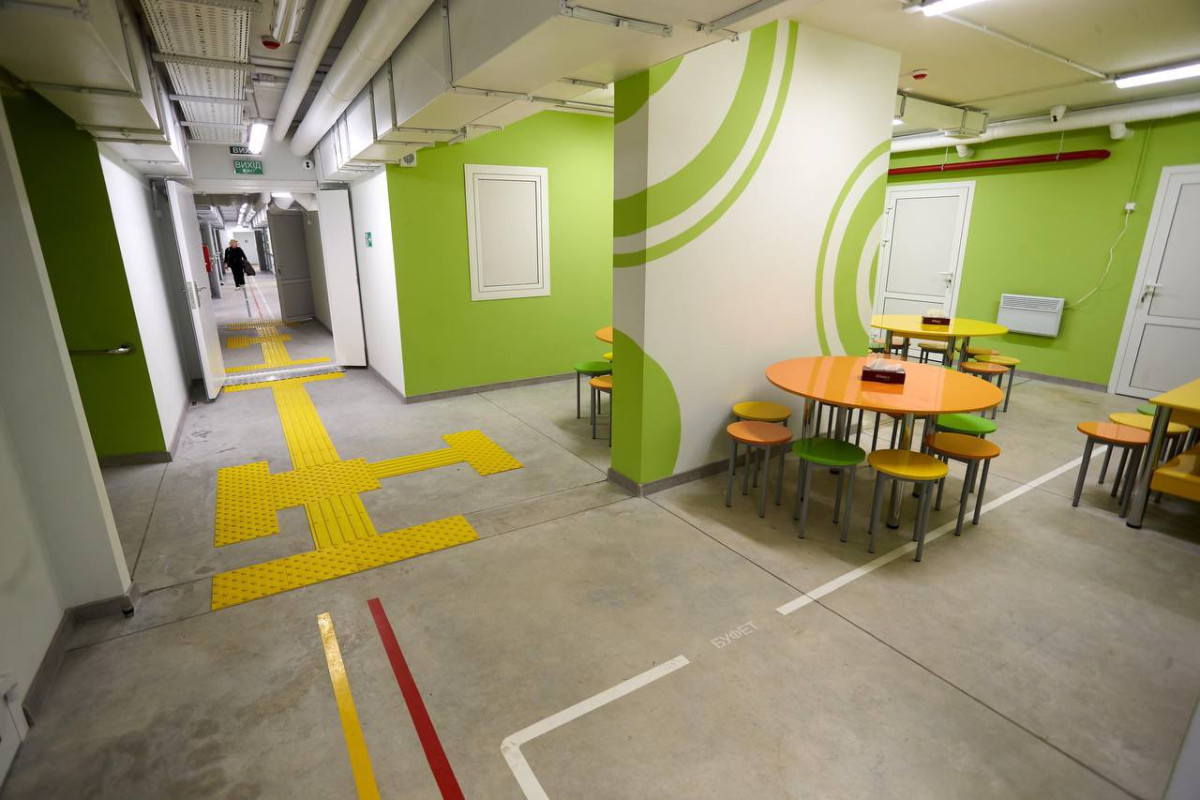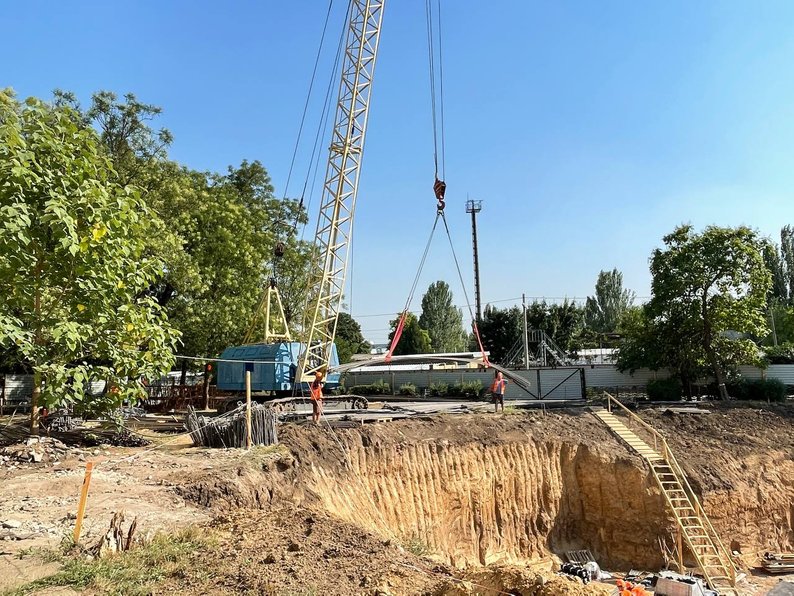

Traditional offline wartime learning is not accessible to everyone. In safer regions, it is feasible to establish a shelter and use it only when necessary. However, in areas facing constant shelling, this format is both inconvenient and dangerous. Air raid alarms can last for most of the day, making it impractical to transport children from the shelter to the classroom every two hours. Additionally, the time to safely move the class to the bomb shelter from the moment the alarm sounds until the first explosions can be alarmingly short. As a result, in cities closer to the front lines, there was no rush to return to traditional offline education. Instead, underground schools began to be tested.
We researched the procurement of their construction on Prozorro, but the term “underground school” is not used there. Generally, they are referred to as anti-radiation shelters (ARS). To distinguish underground schools from standard ARSs, we examined expensive procurements, reviewed estimates to determine what needed to be constructed and equipped, and compared this information with news articles and local council websites.
Kharkiv: innovator of underground education
Kharkiv became the first front-line city to attempt a return to offline education. In the last academic year, classrooms were established in metro stations. As practice has shown, this idea is viable, providing a chance for scalability.
Kharkiv Gymnasium No. 88 served as the foundation for establishing a fully functional underground school, equipped with the necessary communications and a sufficient level of security. The mayor of Kharkiv, Ihor Terekhov, announced the estimated construction cost in October 2023 — UAH 58 million. In December, the design company PrJSC “Zhytlobud-1 Trust” was selected, whose owner is a current member of the city council’s executive committee. They agreed to develop the design project for a little more than UAH 700,000.
The entire construction process, from fall 2023 to spring 2024, was covered by the mayor personally and by regional media. However, the city council announced the Prozorro tender only in March 2024, near the end of the construction. There was little intrigue in this tender: the budget was nearly UAH 59 million, as Terekhov mentioned back in October. The sole participant, PrJSC “Zhytlobud-1 Trust,” submitted a bid just 1 hryvnia below the expected value. The contract was published on April 3, but the media had already reported the completion of the construction the day before — on the same day the contract was signed. However, according to data from the Unified State Electronic System in the Construction Sector, the school was built in just two weeks — from April 5 to 19. This marks what could be considered the fastest construction of the century. The payment for the work was also processed swiftly — on April 20, the contractor received UAH 53 million, and by the end of the month, the company received the remaining amount. For the designer’s supervision of the construction, which is customary for such projects, PrJSC “Zhytlobud-1 Trust” received an additional quarter of a million hryvnias. 
Underground school in Kharkiv, April 2, 2024. Photo credit: Suspilne Kharkiv
We asked the procuring entity how the school was built before the tender was announced. We received a vague response stating that the contract was concluded based on the procurement results. According to this, and in line with the calendar schedule, the contractor carried out the construction work, and as of today, the contract has been fulfilled. Interestingly, the State Audit Service monitored the procurement and found no violations. After repeated requests, the agency promised to re-examine this case during a scheduled inspection of the procuring entity.
Olha Demenko, the Director of the Department of Education of the Kharkiv City Council, reported that up to 900 children will study at the school in two shifts, and three more such facilities will be constructed in the near future. The plan is to establish an underground educational institution in each of the nine districts.
In February, a tender was announced for the design of an underground school at Lyceum No. 153. The contract cost doubled compared to the previous one, reaching almost UAH 1,500,000. The construction cost itself amounted to UAH 70 million, and the winner of the procurement was the sole participant, TT 2006 LLC, which offered a discount of UAH 8,000 to the state. This is not the first time we have analyzed tenders involving this company, and each time we have identified inflated prices. This procurement also came under the scrutiny of our monitoring, where we discovered an overpayment of over UAH 9.5 million. As a result of our report, law enforcement agencies opened criminal proceedings.
Since the beginning of the year, procurements for the development of project documentation for underground schools have appeared on Prozorro, including those for Lyceum No. 138, with an estimated construction cost of up to UAH 98.7 million; Lyceum No. 107, up to UAH 96.5 million; and Lyceum No. 91, up to UAH 98.9 million. As for Lyceum No. 124, it can currently be found only in the DREAM system, as procurements have not yet been announced for it.
In addition, underground schools are already being built in other parts of the region, including Pisochyn, Korotychi, Lozova, and Liubotyn. The design project is just being developed in the Savyntsi community.
Underground school in Kharkiv. Photo credit: Ihor Terekhov.
Zaporizhzhia: ambitious plans and hidden budgets
Ten underground schools are planned for construction in Zaporizhzhia. This announcement was made by Ivan Fedorov, the head of Zaporizhzhya RMA, in the summer. The State Enterprise “Local Roads of the Zaporizhzhia Region” announced the relevant tenders, but competition for them was minimal. While the state enterprise managed project design procurements in Zaporizhzhia, educational institutions handled these procurements directly in other communities.
In April, three design projects for underground schools were directly procured for city institutions — the Hrani Center, Gymnasium No. 107, and Secondary School No. 88. Direct contracts, each valued at UAH 470,000, were signed with the Municipal Enterprise “Hradproekt” of the Melitopol City Council. Contracts with the same company were also signed in the Kushuhum and Shyroke communities, valued at UAH 470,000 and UAH 533,000, respectively. The only exception was the Mykhailivka community, where the design of the anti-radiation shelter at the Balabyne Lyceum “Prestige” was entrusted to NK Astra-Dnipro LLC, with a record contract amount for this region — UAH 720,000.
The designer for the remaining schools announced by the head of the RMA was the Melitopol-based company Hradproekt-M LLC, a namesake of the previously mentioned municipal company. It is owned by Maksym Yehorkin through TECHPROEKT-M LLC.
Zaporizhzhia Collegium “Elint,” Academic Lyceum No. 46, Zaporizhzhia Lyceum “Logos,” and Bilenke Lyceum “Leader” were selected as new locations. Contracts were concluded in May-June.
In July, adjustments were made to the documentation for the first three facilities, with Hradproekt-M LLC becoming the new contractor. In September, the design project for Balabyne Lyceum “Prestige,” originally developed by a company from Dnipro, also required adjustments. Hradproekt-M LLC was again chosen as the contractor for these revisions, as the procuring entity’s rights had already been transferred to the state enterprise.
Zaporizhzhia was the first to announce a tender for the construction of an underground school valued at over UAH 111 million. Unlike the Kharkiv City Council, it was published in advance. Only one participant submitted a bid for the tender.
As of now, 11 such tenders have been announced in the Prozorro system. Of these, 10 have been completed with signed contracts, while one is awaiting a decision on the recognition of the winner. Of the 11 announced tenders, 6 had only one participant. Three companies — Melicity LLC (3 contracts), Adonia Company LLC (2 contracts), and Company Pozytyv LLC (6 contracts) — secured all the contracts without competing against one another. None of these companies encountered each other in the 11 nearly identical tenders. Two additional companies attempted to compete but were unsuccessful in winning any contracts.
We also observed that none of the contracts resulting from these tenders include price information, making it impossible to analyze them for potential overestimation. The Zaporizhzhia Center of Investigation has repeatedly requested the state-owned enterprise to provide estimates to assure the public that there are no fraudulent activities regarding the cost of building materials. However, even a request from MP Yaroslav Yurchyshyn could not persuade the employees to share this billion-hryvnia secret—almost the total estimated cost of the planned construction.
In addition to the mentioned costs, design and technical supervision will be provided on the construction site. The design supervision will be conducted by Hradproekt-M LLC. Technical supervision will be ensured by private entrepreneur V.V. Kudelko (2 contracts worth UAH 2.1 million), TECHPROEKT-M LLC (3 contracts worth UAH 2.7 million), and private entrepreneur M.V. Yehorkin (5 contracts worth UAH 5.5 million).
Technical supervision involves overseeing compliance with the design project solutions and the requirements of state standards, construction norms, and regulations, as well as monitoring the quality and scope of work. The legislation explicitly prohibits technical supervision by employees of design and construction organizations that serve as contractors at these facilities.
Formally, private entrepreneur Yehorkin does not work at Hradproekt-M LLC; he is merely its owner. TECHPROEKT-M LLC does not carry out any work on the facility; it only owns the contracting company. Therefore, the legal requirement has been met; however, in practice, technical supervision may still be potentially linked to the designer.
The construction in Vilniansk, as reported in the media, is being delayed due to the geological features of the selected land; another site will be sought because of groundwater issues.
Footage of the construction of the first underground school in Zaporizhzhia. Photo credit: Suspilne Zaporizhzhia
Kryvyi Rih: expensive
In the Dnipropetrovsk region, they are keeping pace with their neighbors, as similar projects have also emerged in Kryvyi Rih. Three tenders for the construction of underground schools have been announced there. Sapsan-KR LLC became the only participant. The cost of the facilities ranges from UAH 51 million to UAH 63 million. We analyzed the estimates for these constructions and identified a potential overpayment of over UAH 5 million for building materials for each facility. According to the estimates, if 10 schools are built, the total amount of overpayments could equal the cost of an additional school.
Kherson: experience of colleagues
In April of this year, the head of the Kherson CMA visited Kharkiv to share insights on shelter construction. Naturally, he returned with valuable knowledge. At the end of May, procurements for the development of design documentation for underground schools were announced on Prozorro, specifically for Secondary School No. 41, Secondary school No. 55, and Education and Tutoring Complex No. 56. Initially, a contract was signed for the construction of an anti-radiation shelter at School No. 17; however, it was terminated after five days due to the need for design solutions to be reviewed. All contracts for this project were concluded with PrJSC “Zhytlobud-1 Trust” without a tender. It’s worth noting that this is the same company that received all the contracts for the construction of underground schools in Kharkiv.
Plans to build underground medical facilities have also been announced in Kherson. This is undoubtedly an important and necessary decision. We hope it does not become a reason for further public scrutiny.
Other regions
In September, Poltava published its first direct contract for construction (Secondary School No. 55) for UAH 95 million with Alsvit Plus LLC, a company frequently scrutinized in journalistic investigations for overpayments in procurements within the Poltava region. The contract lacks estimate documentation, making it impossible to verify the material costs.
There were similar initiatives in the Donetsk region, where plans were made to build an underground school in Pokrovsk. However, there is currently no information regarding the status of this construction. There are also no completed or active procurements in other cities within the Donetsk region.
As for the Mykolaiv region, the situation is rather ambiguous. Despite its proximity to the war zone, we did not find any confirmation of the construction of underground schools. At the same time, in the spring, the mayor of Mykolaiv, Oleksandr Sienkovych, explained that his family is not returning to Ukraine due to the lack of full-time education. Alla Velikhovska, director of the Department of Education and Science of Mykolayiv RMA, shared in an interview the experience of the Ochakiv community, which, in the fall of 2023, successfully organized a prototype of an underground school and launched offline education for two classes. However, we did not find widespread implementation of these ideas in other communities within the region.
It is also difficult to assess the situation in the Odesa region, as we found no confirmation of plans to build underground schools in either the media or on Prozorro. Regarding the construction in Odesa, Serhii Koleboshyn, Deputy Chairman of the Parliamentary Committee on Education, expressed concerns about the unique challenges posed by underground work in the city, including the presence of numerous catacombs and a high water table.
State support
Despite the challenges, these local initiatives did not go unnoticed. In May, the Ministry of Education and Science approved a list of facilities for financing the creation of safe conditions in schools, allocating 2.5 billion hryvnias from the state budget. In August, the Cabinet of Ministers approved additional funding for this initiative, bringing the total amount of subvention to 7.5 billion hryvnias. Part of this funding will be allocated to finance the construction of new and ongoing underground schools, primarily in Kharkiv and Zaporizhzhia. We hope that next time we will be able to highlight not only violations and schemes but also fair competition, efficient procurement, and genuine budget savings.
International support
This year, the Lithuanian project Co-create Future of Ukraine is selecting design projects for the construction of underground schools. They plan to build one facility each in the Mykolaiv, Odesa, Zaporizhzhia, Sumy, and Chernihiv regions, and potentially in Kharkiv as well. This was announced by Artūras Žarnovskis, head of the Lithuanian Co-create Future of Ukraine program. Local media note that an underground school will be built in the Desna community of the Chernihiv region and in the Shostka community of the Sumy region. We do not know whether bidding will take place on Prozorro or if the organization will transfer already completed design projects to the balance of communities, but we will monitor the situation.
What’s next?
We have a difficult security situation, especially in the frontline regions. The education system is stagnating because it is impossible to fully implement an offline or mixed format. At the same time, the online format is also not always feasible due to power outages. Underground schools present a great option to partially address these issues. The question remains about the sustainability of such a decision—how long will children study in bomb shelters? However, we know for certain that, in the near future, this is nearly the only way to provide children with the opportunity to learn and socialize in a traditional format. This response to society’s needs offers positive hope. However, awarding contracts without a tender or with limited participation is unacceptable.
The material was prepared in cooperation with public procurement expert Borys Nesterov.
This material is funded by the European Union. Its content is the sole responsibility of Transparency International Ukraine and does not necessarily reflect the views of the European Union.








